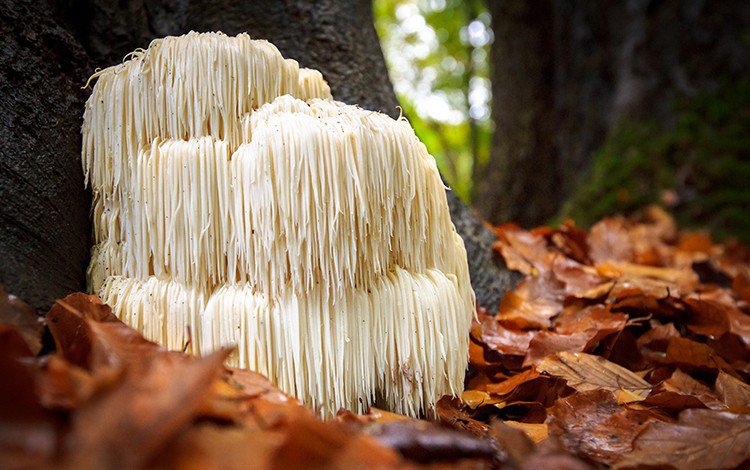
What Is Lion’s Mane Mushroom?
Lion’s Mane Mushroom, also known as Hericium erinaceus or Mane Mushroom, is a type of edible mushroom that has been used for its medicinal properties in traditional Asian medicine for centuries.
It is native to Asian countries but has gained popularity in North America and other parts of the world in recent years. Lion’s Mane Mushroom is known for its unique appearance, resembling a lion’s mane, with long, white shaggy spines. It is commonly consumed in the form of supplements or extracts, and is also used for culinary purposes.
Lion’s Mane Mushroom is believed to have a range of potential health benefits, including improving cognitive function, reducing inflammation, supporting heart health, and enhancing immune function. Research has shown that it may stimulate the growth of brain cells, protect against oxidative stress, and have anti-inflammatory effects.
While it generally considered safe, some individuals may experience adverse effects or allergic reactions. It is recommended to consult with a healthcare professional before using Lion’s Mane Mushroom as a dietary supplement or for medicinal use.
History and Origin
Lion’s Mane, scientifically known as Hericium erinaceus, has a rich and fascinating history. The name “Lion’s Mane” refers to the mushroom’s unique appearance, which resembles the mane of a lion. This medicinal mushroom has been used for centuries in Asian countries, particularly in China and Japan, for its health benefits.
The origin of Lion’s Mane can be traced back to ancient Chinese and Japanese cultures. In Chinese medicine, it is known as “hóutóugū,” which translates to “monkey head mushroom” due to its fuzzy appearance. This name reflects the mushroom’s resemblance to the mane of a lion or the head of a monkey. In Japan, it is called “yamabushitake,” which translates to “mountain priest mushroom,” as it was historically consumed by Buddhist monks for its potential health benefits.
The Latin genus name “Hericium” derives from the Greek word “herikos,” meaning “hedgehog,” referring to the mushroom’s spiky appearance. The species name “erinaceus” is derived from the Latin word for “hedgehog” as well, highlighting the resemblance between the mushroom and the spiny animal.
Today, Lion’s Mane is gaining popularity worldwide for its potential health benefits. It is known for its antioxidant activity, potential anti-inflammatory effects, and possible positive impact on brain health. This functional mushroom can be found in various forms, such as dietary supplements or extracts, and is readily available in health food stores.
Overall, the history and origin of Lion’s Mane Mushroom are deeply rooted in ancient Asian cultures, where it has been cherished for its medicinal properties for centuries. Its unique appearance and potential health benefits continue to captivate researchers and consumers alike.
Uses and Benefits
Studies suggest that Lion’s Mane Mushroom may have cognitive benefits, particularly in relation to age-related cognitive decline and memory issues. It is believed to promote the growth of brain cells and enhance cognitive function.
Additionally, Lion’s Mane medicinal mushroom shows promise in maintaining heart health. It may help reduce the risk of cardiovascular conditions by lowering cholesterol levels and preventing blood clotting.
With its potential anti-inflammatory effects, it may also assist in reducing inflammation and supporting overall well-being. It has been studied for its potential benefits in managing conditions such as inflammatory bowel disease and ulcerative colitis.
Moreover, it has been shown to help regulate blood sugar levels. This can be beneficial for individuals with diabetes or those looking to maintain stable blood sugar levels.
It can be consumed or used in various ways, making it easily accessible. It can be enjoyed in culinary dishes, taken as dietary supplements or extracts, or incorporated into beverages.
Lion’s Mane offers a multitude of uses and benefits, including its potential for cognitive enhancement, heart health support, anti-inflammatory effects, and blood sugar level regulation. Its versatility and availability make it a popular choice for individuals seeking natural health solutions.
Nutrition Facts
Lion’s Mane Mushroom is not particularly known for its macronutrient content, as it is low in calories, fat, and carbohydrates. However, it is rich in fiber, making it a great addition to a balanced diet.
In terms of micronutrients, Lion’s Mane Mushroom is a good source of various vitamins and minerals. It contains significant amounts of vitamins B1 (thiamine), B2 (riboflavin), B3 (niacin), B5 (pantothenic acid), and B9 (folate). These vitamins are important for supporting energy production, brain function, and cell health.
It also provides minerals such as potassium, zinc, and copper. Potassium is essential for maintaining proper heart and muscle function, while zinc is important for immune health and wound healing. Copper is needed for the production of red blood cells and collagen, a protein that helps maintain strong and healthy skin.
Overall, while the mushroom may not be a significant source of macronutrients, it offers an array of important micronutrients that can contribute to a well-rounded and nutritious diet.
Note: The information provided here is based on general knowledge of Lion’s Mane Mushroom and its nutrient content. For specific and detailed nutritional information, it is recommended to consult a reliable source or nutritionist.
Potential Health Benefits
Lion’s Mane medicinal Mushroom has gained attention for its potential health benefits. Preliminary studies suggest that this unique mushroom may have positive and beneficial effects on various health conditions.
One area of interest is its impact on Alzheimer’s disease. Animal studies have shown that Lion’s Mane Mushroom has the potential to promote the growth of brain cells and enhance cognitive function, potentially offering promise in the field of neurodegenerative disorders.
In addition, Lion’s Mane Mushroom may have a positive effect on anxiety and depression. Animal studies have indicated that it may help reduce symptoms of anxiety and depression by promoting the release of certain neurotransmitters in the brain.
Another potential benefit is its impact on cholesterol levels. Some studies suggest that it may help lower LDL (bad) cholesterol and triglyceride levels, which may contribute to a reduced risk of heart disease.
Furthermore, the mushroom’s anti-inflammatory properties are being explored. Limited studies suggest that Lion’s Mane Mushroom may help reduce inflammation in the body, which could potentially benefit individuals with inflammatory conditions.
It is important to note that most of the research on Lion’s Mane Mushroom has been conducted on animals, using test-tube experiments and small clinical trials. More extensive research is needed before firm conclusions can be drawn. It is always recommended to consult with a healthcare professional before incorporating Lion’s Mane Mushroom into your routine for specific health conditions.
Research on Lion’s Mane Mushroom
Research on Lion’s Mane Mushroom has shown promising results in various areas of health. Studies have indicated its potential to promote brain cell growth and enhance cognitive function, making it a potential candidate for Alzheimer’s disease treatment.
Additionally, Lion’s Mane Mushroom has been found to have positive effects on anxiety and depression, possibly by influencing neurotransmitter release. Its cholesterol-lowering properties may contribute to reducing the risk of heart disease.
Furthermore, the anti-inflammatory properties of Lion’s Mane Mushroom are being explored, which could be beneficial for individuals with inflammatory conditions. Overall, ongoing research on Lion’s Mane Mushroom highlights its potential as a functional mushroom with significant health benefits.
Cognitive Impairment
Lion’s mane mushroom, scientifically known as Hericium erinaceus, has been found to have remarkable effects on cognitive function, particularly in individuals with mild cognitive impairment (MCI). MCI is a condition that involves a slight decline in memory and thinking skills, which is often considered a precursor to conditions like Alzheimer’s disease.
Research has shown that lion’s mane mushroom can potentially improve brain function and protect against memory problems. In animal studies, lion’s mane supplementation has been found to promote the growth of brain cells, enhance memory, and improve cognitive performance. These effects are believed to be attributed to the mushroom’s ability to stimulate the release of nerve growth factors that are vital for the development and survival of brain cells.
In human studies, the benefits of lion’s mane mushroom on cognitive function have also been observed. Specifically, older adults with mild cognitive impairment who consumed lion’s mane supplements experienced improvements in cognitive abilities, including their memory and attention span. Moreover, some studies suggest that lion’s mane mushroom may offer potential protective effects against the progression of Alzheimer’s disease.
Overall, the evidence suggests that lion’s mane mushroom holds promise as a natural supplement for supporting brain health, particularly in individuals with cognitive impairments. However, more research is still needed to fully understand its mechanisms of action and its potential benefits in preventing or treating cognitive decline in various populations.
Heart Health
Research conducted primarily on animal subjects suggests that lion’s mane extract may have a potential impact on heart health. Animal studies have demonstrated that lion’s mane mushroom possesses antioxidant and anti-inflammatory properties, which are important factors in maintaining heart health. These properties may help reduce oxidative stress and inflammation, leading to improved cardiovascular function.
However, when it comes to the effects of lion’s mane mushrooms on heart health in humans, there is limited evidence available. While some studies have investigated the potential benefits of lion’s mane extract for various health conditions, including cardiovascular disease, research specifically targeting heart health is still scarce.
More studies are needed to further explore the effects of lion’s mane extract on heart health in humans, especially in relation to conditions such as cardiovascular disease. It is important to note that the available evidence is largely based on animal research, and extrapolating these findings to humans should be done with caution.
Although animal studies suggest that lion’s mane extract may have a positive impact on heart health, there is limited evidence regarding its effects in humans. Further research is necessary to fully understand the potential benefits of lion’s mane mushrooms for heart health, especially in the context of cardiovascular disease.
Anti-inflammatory Effects
Lion’s mane mushroom (Hericium erinaceus) has gained attention for its potential anti-inflammatory effects, offering promising therapeutic benefits for various chronic diseases. Several studies have demonstrated its ability to reduce inflammation associated with conditions such as ulcerative colitis and liver damage induced by excessive alcohol consumption.
Research has shown that lion’s mane mushrooms contain powerful compounds that can combat inflammation. For instance, a study published in the journal Evidence-Based Complementary and Alternative Medicine found that lion’s mane extract significantly reduced inflammatory markers in mice with ulcerative colitis, a chronic inflammatory bowel disease. The extract was able to suppress the production of certain pro-inflammatory molecules and inhibit the activation of inflammatory pathways.
Additionally, another study published in the International Journal of Medicinal Mushrooms explored the anti-inflammatory effects of lion’s mane mushrooms on liver damage caused by alcohol. The study’s findings revealed that the mushroom extract exhibited significant anti-inflammatory activity, reducing markers of liver inflammation and oxidative stress.
These anti-inflammatory properties can be attributed to the presence of bioactive compounds like polysaccharides and hericenones in lion’s mane mushrooms. These compounds possess potent antioxidant and anti-inflammatory properties, which may help lower the impact of chronic illnesses associated with excess inflammation.
While further research is needed to fully understand the mechanisms and therapeutic potential of lion’s mane mushrooms, these studies highlight their potential as natural anti-inflammatory agents. Incorporating lion’s mane mushrooms into one’s diet or considering dietary supplements may be a promising approach in managing chronic inflammatory conditions like ulcerative colitis.
Blood Sugar Levels
Lion’s Mane Mushroom has been found to have positive effects on blood sugar levels, making it a potential aid in controlling blood sugar, especially in individuals with diabetes.
High blood sugar levels can lead to various health complications, including nerve damage and cardiovascular issues. It is crucial for individuals with diabetes to maintain their blood sugar levels within a healthy range.
Research studies have shown that Lion’s Mane Mushroom contains bioactive compounds that can help regulate blood sugar levels. A study published in the journal Foods found that the consumption of Lion’s Mane Mushroom extract in diabetic mice resulted in lower blood sugar levels compared to the control group.
The potential benefits of Lion’s Mane Mushroom in controlling blood sugar levels can be attributed to its ability to increase insulin sensitivity and prevent insulin resistance. Insulin is a hormone that helps regulate blood sugar levels, and when the body becomes resistant to its effects, blood sugar levels can rise.
Further research conducted in animal models and cell cultures have also demonstrated the potential of Lion’s Mane Mushroom in protecting against complications associated with high blood sugar levels, such as nerve damage. These findings indicate the potential of Lion’s Mane Mushroom as a natural supplement to help individuals with diabetes maintain healthier blood sugar levels.
Therapeutic Effects
Lion’s Mane Mushroom has been traditionally used in Asian countries for its therapeutic effects. This medicinal mushroom has gained popularity for its potential benefits in treating various health conditions.
One of the key therapeutic effects of Lion’s Mane Mushroom is its ability to support brain health. Research suggests that certain compounds in this mushroom can stimulate the growth of brain cells, potentially improving cognitive function and reducing the risk of cognitive impairment.
Furthermore, Lion’s Mane Mushroom has been found to have anti-inflammatory effects, which may benefit individuals with inflammatory bowel disease or other inflammatory conditions. It may help alleviate symptoms and reduce inflammation in the digestive system.
Safety considerations are important when using any therapeutic treatment. While Lion’s Mane Mushroom is generally regarded as safe, some individuals may experience adverse effects such as an allergic reaction. It is advised to start with small doses and consult a healthcare professional before incorporating Lion’s Mane Mushroom into your regimen.
Regarding possible drug interactions, limited information is available. However, it is always recommended to consult a healthcare professional, especially if you are taking medications, to ensure there are no potential interactions with Lion’s Mane Mushroom.
In conclusion, Lion’s Mane Mushroom offers therapeutic effects that may benefit brain health and alleviate inflammation in certain health conditions. As with any therapeutic treatment, it is important to consider safety precautions and potential drug interactions.
Safety Considerations
While Lion’s Mane Mushroom is generally regarded as safe, it is important to be aware of certain safety considerations before incorporating it into your health regimen.
As with any therapeutic treatment, individuals may react differently, and some may experience adverse effects such as an allergic reaction. It is advisable to start with small doses and monitor your body’s response before increasing the amount.
Additionally, if you have any existing medical conditions or are taking medications, it is crucial to consult a healthcare professional before using Lion’s Mane Mushroom to ensure there are no potential interactions. They can provide personalized guidance and ensure that it is safe for you to incorporate this medicinal mushroom into your routine.
By taking these safety considerations into account, you can confidently enjoy the potential health benefits of Lion’s Mane Mushroom while prioritizing your well-being.
Adverse Effects of Lion’s Mane Mushroom
Lion’s Mane Mushroom, also known as Hericium erinaceus, is a popular, edible mushroom that has gained attention for its potential health benefits. While it offers several positive effects, it is essential to be aware of the potential adverse effects that may occur.
Reported side effects of Lion’s Mane Mushroom include upset stomach, nausea, diarrhea, and skin rash. These symptoms usually occur when the mushroom is consumed in excessive amounts or by individuals who are particularly sensitive to it.
In some cases, allergic reactions may occur after consuming Lion’s Mane Mushroom. This can range from mild reactions such as itching and hives to more severe symptoms like breathing problems or swelling. If any of these symptoms arise, immediate medical attention should be sought.
It is crucial to consult with a healthcare professional before incorporating Lion’s Mane Mushroom into your diet, especially if you have allergies, asthma, or any other medical condition. They can provide guidance on the appropriate dosage and potential risks based on your specific health requirements.
While Lion’s Mane Mushroom offers several potential health benefits, it is crucial to be cautious and monitor your body’s response to it. If any adverse effects occur or if you have any concerns, it is advisable to discontinue use and seek medical advice.
Possible Drug Interactions
Lion’s Mane Mushroom is a popular medicinal mushroom that has been traditionally used in Asian countries for its potential health benefits. While it is generally considered safe for consumption, it is important to be aware of potential drug interactions when incorporating Lion’s Mane Mushroom into your regimen.
One possible drug interaction to be cautious about is its antiplatelet effects. Lion’s Mane Mushroom may have the ability to thin the blood, similar to anticoagulant medications. Therefore, combining Lion’s Mane Mushroom with anticoagulants could increase the risk of bleeding. It is advisable to consult with a healthcare professional if you are taking any blood-thinning medications before adding Lion’s Mane Mushroom to your routine.
Additionally, Lion’s Mane Mushroom has been reported to have an effect on lowering blood sugar levels. If you are already taking medications or supplements that also reduce blood sugar, combining them with Lion’s Mane Mushroom could potentially result in hypoglycemia (low blood sugar). It is important to monitor your blood sugar levels closely and consult with a healthcare professional to ensure safe and effective use.
In summary, while Lion’s Mane Mushroom offers potential health benefits, it is essential to be aware of possible drug interactions. Consultation with a healthcare professional can provide guidance on avoiding adverse effects and ensuring the safe and effective use of Lion’s Mane Mushroom.


































